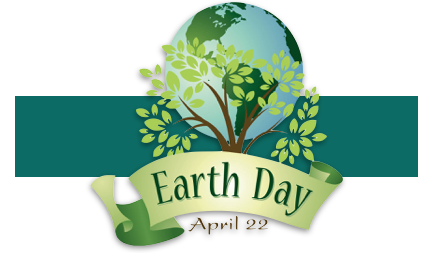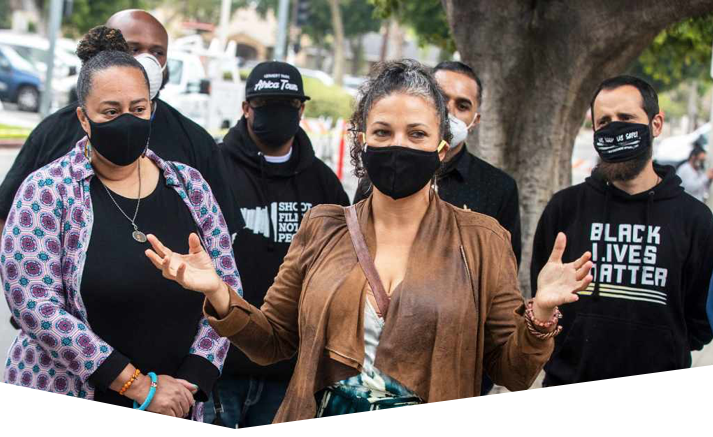CommentsRACIAL RECKONINGS - The holiday season is in full swing, with Christmas carols on the radio and shopping sales luring customers to spend their cash.
In spite of rising inflation, retail numbers are high and economists predict a robust Black Friday sales surge. But this year, rather than giving into the consumerist pressure of the season, the Black Xmas campaign started by Black Lives Matter Los Angeles urges shoppers to use their dollars wisely and in service of racial justice.
In November 2013, Melina Abdullah, one of the founders of Black Xmas, wrote the following in a Facebook post four months after the formation of Black Lives Matter:
Under capitalism, we are trained to compete rather than cooperate, to hoard rather than share, and to hate rather than love. Capitalism breeds a coarse, cold, cruel world. As revolutionaries, we are charged with transforming the system. Living a life of loving kindness is a good first step. #BeKind.
Abdullah is a professor in the Department of Pan-African Studies at California State University, Los Angeles. A prominent leader in BLMLA, she helped start the Black Xmas campaign to promote Black-led organizations and Black-owned businesses and banks during the holiday season.
Abdullah spoke with YES! Racial Justice Editor Sonali Kolhatkar about how the campaign was started and what it aims to do.
This interview has been edited for clarity and length.
Kolhatkar: Did the Facebook post you wrote in November 2013 express the philosophical basis for the Black Xmas campaign?
Abdullah: There’s always been an analysis of the relationship between racism and capitalism. Malcolm X says you cannot have capitalism without racism, and that’s absolutely a truism that we see emerge in this Black Lives Matter movement/moment.
When we were birthed, BLM had a critique of capitalism, and understood that capitalism necessitates harm brought on Black communities and the exploitation of Black labor, exploitation of Black consumers, exploitation of people of color. We understood that from the very beginning.
With the murder of John Crawford inside a Walmart store [in Ohio], it really brought everything home. It helped us to understand that as we confront systems of policing, as we recognize police as the descendants of slave catchers, we also have to think about them as protectors of capital and protectors of the ownership class and how that steals Black life, including the life of Crawford.
We also began to think about the role of White supremacist capitalism and the theft of Black life. And so, we birthed Black Xmas and really tried to get Black people to be conscious of the way in which we use our dollars and our resources. Are we feeding a system of White supremacy that steals Black Life, or are we using resources to really build stronger Black communities?
Remember that you don’t just have to be in a frenzy and run into these stores and buy people things that they don’t need. You can use your dollars to really build strong Black communities.
Over the last six years, Black Xmas has had three core tenets: Building Black, Buying Black, and Banking Black.
Take Building Black. Rather than buying people things, think about what your mother would want other than, say, a sweater. Maybe your mother is a lover of the arts, and maybe she would be grateful if you would donate in her name to the Fernando Pullum Community Arts Center, which provides free arts programs for Black children.
Maybe your aunt is a survivor of domestic violence, and maybe she would appreciate a donation in her name to the Jenesse Center, which provides housing and resources for survivors—especially Black women survivors—of domestic violence.
That’s really what Black Xmas is about. It’s about shaking off the chains of consumerism and confronting White capitalism but also building new traditions.
Kolhatkar: Is there a reason why it’s Black “Xmas” and not “Christmas”?
Abdullah: Well, I’m not that Christian, but I was absolutely raised in a Christian church by a mother who still practices Christianity, by a family that’s largely Christian.
And we have to remember that the largest groups of Muslims—the plurality of Muslims in this country—are Black. We have to remember that there are a lot of Black folks who don’t identify with Christianity, and even Christians who don’t practice Christmas. So, we wanted it to be as inclusive as possible.
We call the holiday season a “Season of Giving,” and we actually have, on our Black Xmas website, cards that people can download that say, “This season of giving, please donate in my name rather than buying me a gift.” So Black Xmas is being used as a more inclusive term for people who practice Christmas, for people who practice Kwanzaa or any other holiday during this season, or no holiday at all, but still want to practice giving and building Black communities.
Kolhatkar: In addition to making donations to organizations, what about also supporting Black entrepreneurs and artists?
Abdullah: The second tenet of Black Xmas is Buying Black. Sometimes, your mother really does need a sweater. Rather than giving your money to Macy’s, you can go to Nobody Jones or other Black boutiques.
Rather than buying from Amazon, a company that we know exploits its workers, you can go to small Black-owned bookstores, like Eso Won Books or Malik Books.
Did you know that there’s a Black-owned skateboard shop? If your kid really needs a skateboard for the holidays, you can go to The Rad Black Kids and buy a skateboard. The brother there who started Rad Black Kids has intentionally based his business in Compton and employs Compton residents to work there.
So rather than going to businesses that don’t value Black people, that don’t contribute to the building of Black community, we have a pretty strong list of Black organizations and businesses that you can buy from.
Kolhatkar: What about the third tenet of Banking Black?
Abdullah: Remembering where our dollars are housed is also important. So if you bank at Citibank, you are financing our oppression. If you bank at Bank of America or Wells Fargo, you need to think about how they invest in private prisons and ask, are your dollars being used for the financing of environmental degradation, like the Dakota Access Pipeline and other problematic projects? So we encourage people to move their money to Black-owned banks.
Kolhatkar: Is engaging with Black Xmas this year a chance for non-Black people who say “Black Lives Matter” to prove it?
Abdullah: Put your money where your mouth is—literally. So if you want to say “Black Lives Matter,” make Black lives matter by investing in Black communities.
We know throughout the pandemic about 40% of Black-owned businesses permanently shuttered. This is a way of supporting those that remained and investing in those that are seeking to emerge coming back out of this pandemic.
A lot of Black folks also lost their jobs, so they’re launching new businesses. So this is a way for all people all around the world to really make Black lives matter.
Kolhatkar: How do you square your critique of capitalism by encouraging people to still engage in consumerism but just narrow it to Black-owned businesses and banks?
Abdullah: We’re not seeking to create richer Black capitalists. When we say “Buy Black,” we’re really looking at small Black-owned businesses. Most Black-owned businesses have 1–2 employees, and oftentimes, the employees are the owners and the owners’ families. This is not about enriching Black capitalists. This is about building strong Black communities so that we can have a degree of autonomy and self-determination.
When we think also about what Black-owned businesses do for the Black community, they—more than any other type of business—also create livable-wage jobs for other Black people. I think about restaurants in Los Angeles, like Simply Wholesome, which intentionally employs returning citizens.
So this is not about trading Black capitalism for White capitalism. This is about really thinking about what cooperative economics … the principle of “Ujamaa” is and how we can use our dollars to begin to create those systems.
Kolhatkar: The Black Xmas website lists businesses in Southern California, including Los Angeles and Long Beach. But it also includes South Bend, Indiana, and Michigan. What is the geographic reach of the campaign?
Abdullah: Black Lives Matter is a global movement, which means many of our chapters are becoming involved in Black Xmas. The campaign originated in Black Lives Matter Los Angeles, which was the first chapter of Black Lives Matter and is still the largest one. But other BLM chapters are also engaging. All of the BLM chapters in Michigan and BLM in South Bend, Indiana, are also participating.
If businesses want to be featured, they can send an email to [email protected]. We’re still trying to carry the bulk of the work, but if they email us, regardless of where they are, we’ll look at their business, and if we have a chapter there, we can feature their business on our social media platforms.
We’re not the only organization that does “Buy Black” work. There is a website called WeBuyBlack.com that has things like laundry detergent, batteries, and toilet paper! All of these things that you probably didn’t know exist as Black-owned businesses.
Many of the businesses that we feature are online rather than solely brick-and-mortar. So you can always order online.
(SONALI KOLHATKAR is currently the racial justice editor at YES! Media and a writing fellow with Independent Media Institute. She was previously a weekly columnist for Truthdig.com. She is also the host and creator of Rising Up with Sonali, a nationally syndicated television and radio program airing on Free Speech TV and dozens of independent and community radio stations.)















